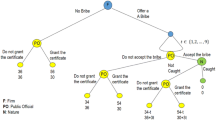Abstract
This paper tries to answer the question why the phenomenon of corruption seems to be inherently existent in any society. The dynamic model presented shows how rational agents may generate multiple equilibria of corruption within the same kind of socio-economic system. We assume that the individual disutility caused by the loss of reputation from a corrupt transaction depends on the acceptance of corrupt behavior by the representative individual. Depending on the values of some key parameters like the marginal utility of corrupt behavior and the initial acceptance of corruption a completely corrupt equilibrium where all people completely accept corruption or a completely honest equilibrium where corruption is not accepted at all may be the limit state of the optimal path. Also inner equilibria in-between exist; however, they are always unstable.
Similar content being viewed by others
References
Akerlof, G. A. (1980): “A Theory of Social Custom, of Which Unemployment May Be One Consequence.”Quarterly Journal of Economics 94: 749–775.
Andvig, J. C. (1991): “The Economics of Corruption: a Survey.”Studi Economici 43: 57–94.
Antoci, A., and Sacco, P. L. (1995): “A Public Contracting Evolutionary Game with Corruption.”Journal of Economics/Zeitschrift für Nationalökonomie 61: 89–122.
Basu, K., Bhattacharya, S., and Mishra, A. (1992): “Notes on Bribery and the Control of Corruption.”Journal of Public Economics 48: 349–359.
Biccheri, C., and Rovelli, C. (1995): “Evolution and Revolution: the Dynamics of Corruption.”Rationality and Society 7: 201–224.
Dawid, H., and Feichtinger, G. (1996): “Optimal Allocation of Drug Control Efforts: a Differential Game Analysis.”Journal of Optimization Theory and Applications 91: 279–297.
Feichtinger, G., and Hartl, R. F. (1986):Optimale Kontrolle ökonomischer Prozesse: Anwendungen des Maximumprinzips in den Wirtschaftswissenschaften. Berlin: de Gruyter.
Feichtinger, G., and Wirl, F. (1994): “On the Stability and Potential Cyclicity of Corruption in Governments Subject to Popularity Constraints.”Mathematical Social Sciences 28: 113–131.
Hartl, R. F. (1987): “A Simple Proof of the Monotonicity of the State Trajectories in Autonomous Control Problems.”Journal of Economic Theory 41: 211–215.
Marjit, S., and Shi, H. L. (1996): “On Controlling Crime with Corrupt Officials.”Journal of Economic Behavior and Organisation (forthcoming).
Michel, P. (1982): “On the Transversality Condition in Infinite Horizon Optimal Control Problems.”Econometrica 50: 975–985.
Mookherjee, D., and Png, I. P. L. (1995): “Corruptible Law Enforcers: How Should They Be Compensated.”Economic Journal 105: 145–159.
Rauch, B. (1995): “On the Monotonicity of the State Variable in Autonomous Control Problems.” Mimeo, University of Regensburg, Regensburg.
Rose-Ackerman, S. (1978):Corruption: a Study in Political Economy. New York: Academic Press.
Seierstad, A., and Sydsaeter, K. (1993):Optimal Control Theory with Economic Applications. Amsterdam: North-Holland.
Wirl, F., Novak, A., Feichtinger, G., and Dawid, H. (1995): “Indeterminacy of Open-Loop Nash Equilibria: the Ruling Class versus the Tabloid Press.” InUncertainty: Models and Measures, edited by Y. Ben-Haim. Berlin: Akademie-Verlag (forthcoming).
Author information
Authors and Affiliations
Rights and permissions
About this article
Cite this article
Dawid, H., Feichtinger, G. On the persistence of corruption. Zeitschr. f. Nationalökonomie 64, 177–193 (1996). https://doi.org/10.1007/BF01250114
Received:
Revised:
Issue Date:
DOI: https://doi.org/10.1007/BF01250114




